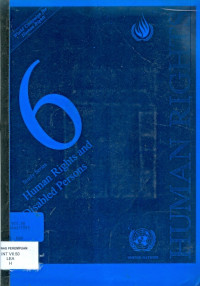
Text
Human rights and disabled persons
Chapter I deals deals in particular legal issues regarding disabled persons and the formulation of an adequate definition of disablity. Chapter II discusses factors causing disability, with particular reference to violations of human rights and humanitarian law as such factors. Chapter III describes the prejudices, discrimination and other violations of human rights to which disabled persons are subjected. Chapter IV sets out the national and international policies and measures designed to eradicate discriminatory practices and guarantee the disabled the full enjoyment of human rights. Chapter V is concerned with public information and education. Persons with disabilities face discrimination and barriers that restrict them from participating in society on an equal basis with others every day. They are denied their rights to be included in the general school system, to be employed, to live independently in the community, to move freely, to vote, to participate in sport and cultural activities, to enjoy social protection, to access justice, to choose medical treatment and to enter freely into legal commitments such as buying and selling property. A disproportionate number of persons with disabilities live in developing countries, often marginalized and in extreme poverty. The protection guaranteed in other human rights treaties, and grounded in the Universal Declaration of Human Rights, should apply to all. Persons with disabilities have, however, remained largely ‘invisible’, often side-lined in the rights debate and unable to enjoy the full range of human rights. In recent years, there has been a revolutionary change in approach, globally, to close the protection gap and ensure that persons with disabilities enjoy the same standards of equality, rights and dignity as everyone else. The Convention on the Rights of Persons with Disabilities, which was adopted in 2006 and entered into force in 2008, signalled a ‘paradigm shift’ from traditional charity-oriented, medical-based approaches to disability to one based on human rights. Former UN High Commissioner for Human Rights, Louise Arbour, said, “The celebration of diversity and the empowerment of the individual are essential human rights messages. The Convention embodies and clearly conveys these messages by envisaging a fully active role in society for person with disabilities.”
Availability
| KP.IV.5.00019 | KP.IV.5 DES h | My Library | Available |
Detail Information
- Series Title
-
Human Rights Study Series 6
- Call Number
-
KP.IV.5 DES h
- Publisher
- New York : United Nations., 1993
- Collation
-
43 hlm; 30 cm
- Language
-
English
- ISBN/ISSN
-
-
- Classification
-
KP.IV.5
- Content Type
-
-
- Media Type
-
-
- Carrier Type
-
-
- Edition
-
-
- Subject(s)
- Specific Detail Info
-
-
- Statement of Responsibility
-
-
Other version/related
No other version available
File Attachment
Comments
You must be logged in to post a comment
 Computer Science, Information & General Works
Computer Science, Information & General Works  Philosophy & Psychology
Philosophy & Psychology  Religion
Religion  Social Sciences
Social Sciences  Language
Language  Pure Science
Pure Science  Applied Sciences
Applied Sciences  Art & Recreation
Art & Recreation  Literature
Literature  History & Geography
History & Geography